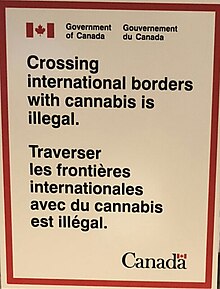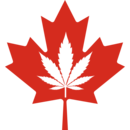
| Part of a series on |
| Cannabis in Canada |
|---|
 |
|
|
On October 17, 2018, cannabis was legalized in Canada for recreational and medical purposes. It was already legal for medicinal purposes, under conditions outlined in the Marihuana for Medical Purposes Regulations[1] issued by Health Canada, and for seed, grain, and fibre production under licence by Health Canada.[2]
The legalization for recreational purposes was achieved with the passage of Bill C-45, the Cannabis Act by Parliament on 19 June 2018. Legalization was effective on October 17, 2018.[3][4] Adults 18 and over can possess up to 30 grams (1.05 oz) of dried or “equivalent non-dried form” in public. Adults are also allowed to make cannabis-infused food and drinks "as long as organic solvents are not used to create concentrated products."[5][6]
- ^ "Access to Cannabis for Medical Purposes Regulations". laws-lois.justice.gc.ca/. Archived from the original on 19 July 2021. Retrieved 20 March 2017.
- ^ "Industrial Hemp Regulation Program FAQ". Health Canada. November 2012. Archived from the original on 27 September 2018. Retrieved 30 October 2013.
- ^ Scott, Monique (June 20, 2018). "Marijuana to be legal in Canada starting October 17, Trudeau confirms". Global News. Archived from the original on September 27, 2018. Retrieved October 28, 2018.
- ^ "The Cannabis Act: The Facts". Health Canada. Government of Canada. 20 June 2018. Archived from the original on 28 October 2018. Retrieved 27 October 2018.
- ^ "Marijuana is legal everywhere across Canada now". Inside Halton. Metroland News. 17 October 2018. Archived from the original on 28 October 2018. Retrieved 27 October 2018.
- ^ "Cannabis is legal in Canada — here's what you need to know". CBC News. CBC. 17 October 2018. Archived from the original on 25 October 2018. Retrieved 27 October 2018.